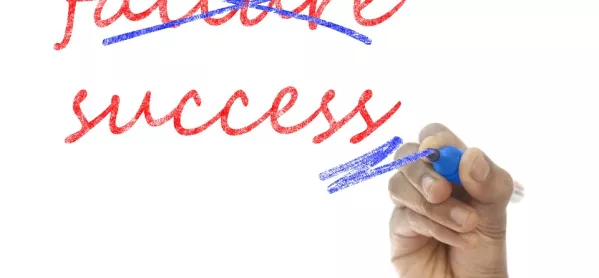The freedom to fail is one we try to grant to our students at will. We tell them to push their boundaries, we tell them to try their best and not to fear failure, we push the growth mindset mantra. We pick them up when they fall down and we always start with a clean slate. But with the adults in school too often it’s a different story.
Teachers should also be able to make mistakes without fear - multiple mistakes. They should be able to utterly fail in a variety of areas, perhaps not indefinitely, but certainly for a while. They should be allowed to make those mistakes. They should be allowed to find their own path to improvement and not be “directed” down a certain avenue. They should be actively encouraged to figure out what works for them.
Teacher learning is important, so is teacher trying, failing, evolving and improving. Maria Cowler, headteacher, said it best on Twitter: “No school can claim to be interested in anything to do with a growth mindset if teachers are not allowed to try, fail, reflect and improve.”
In schools today, the drive to improve “standards” and secure “rapid improvement” often leads to a set of behaviours that make teachers scared to experiment, scared to innovate and scared to learn. Perhaps the worst offshoot of this culture is a reticence to approach colleagues or leaders with the opening gambit “I don’t know what I’m doing” or “I have completely messed up”.
This attitude can have dangerous symptoms, notably a reluctance to use a school sanction system for the sake of saving face - “looking bad on behaviour” can be a real driver for teachers not only failing to deal with poor behaviour in the classroom but also failing to develop their own classroom management, which is sad. Equally, in the realm of data, inflating scores on data drops to avoid any awkward “interrogation of your data” meetings, done out of fear of failure and with knock-on effects on progress calculations down the line.
Afraid to innovate
Perhaps the most telling impact of a fear factor culture is a lack of willingness to experiment or innovate in the classroom, an essential part of teacher development, particularly for those in their formative years.
An “I’ll try to do what everyone else is doing” rather than an “I’ll do whatever works for me and my students” mentality can be harboured. Consequently, teachers find themselves stranded and not able to capture their “teacher selves” and reach a level of comfort in their own practice.
I’ve been very fortunate that I’ve worked with leaders who I’ve been able to go to and say “I’ve messed up”. I remember one particular example where I thought I had lost some coursework, I was in a state of monumental stress and had no hesitation in texting him to share my quandary, to which I received the response “Don’t worry, they’ll turn up” (they did).
Contrast that with teachers who feel they have to strike a DfE-style pose every time a school leader walks past their classroom. Contrast that with teachers who spend longer than their own students making books “look good”, cutting and sticking and arranging, so if anyone comes into their classroom, they can share them. Contrast that with the teacher who is scared to be seen in the staff car park before a certain time on a Friday. The list goes on.
Too many schools have become Gestapo-like in their ethos, many without even knowing it. Retention figures tell a story though.
Failure is as important as success in teaching and learning. Recognising that creates more effective teachers in the long term.
Thomas Rogers is a teacher who runs rogershistory.com and tweets @RogersHistory
For more columns by Tom, view his back catalogue




